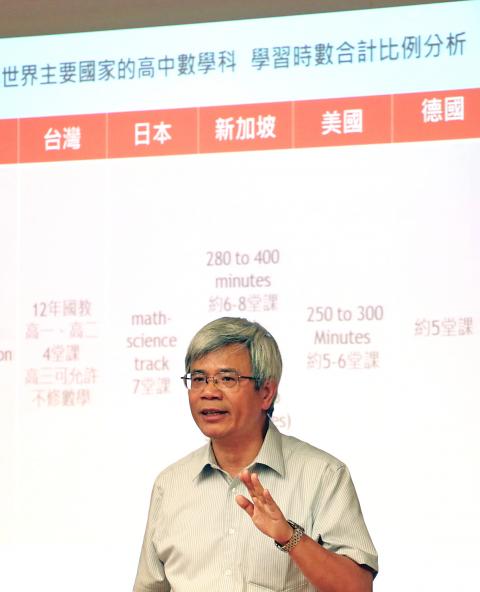Nearly 100 members of Academia Sinica have signed a petition against halving the required number of mathematics credits for senior-high school students as proposed in the draft 12-year national education program guidelines.
They said the reduced course load would weaken the nation’s competitiveness.
Four mathematicians who are also members of Academia Sinica held a press conference at National Taiwan University (NTU) in Taipei yesterday to announce that the petition, which calls on the government to reconsider its plan.

Photo: CNA
The petition has been signed by 93 academicians, including renowned historian Yu Ying-shih (余英時) and former Academia Sinica president Lee Yuan-tseh (李遠哲).
“Mathematics is widely recognized as a fundamental tool of science and technology” and a “math course is not only about attaining mathematical knowledge, but, more importantly, about training one in logical thinking and deductive ability,” the petition says.
Under the draft guidelines, the number of required math credits would be cut from 24 to 12 hours.
Math courses will only be required up to the first semester of grade 11 and become electives afterward, but “no country only requires senior-high school students to take math courses until the 11th grade,” NTU math professor Lin Chang-shou (林長壽) said.
“Allowing students to have one-and-a-half years where they do not have to take a math course could be seen as the state giving up on them,” he said.
While students from better-off families might be able reinforce their math education, students from disadvantaged families will be deprived of adequate education that could help them enter better universities, Lin said.
Yau Shing-tung (丘成桐), a former Harvard University professor and a Fields Medal winner, said the plan would damage the cultivation of Taiwan’s talented youngsters, because mathematics is the basis for excelling in science, engineering and other disciplines.
Yau showed journalists a letter from a Harvard professor about Taiwan’s plan to reduce the math course requirement, which reads: “that is shocking. In the US, high-tech companies are complaining that math education is too weak … have they considered what downgrading the role of math in high schools will do to Taiwan’s economic health?”
“Mathematic ability usually takes a long time to build up, so it is harder to reinforce the students’ ability after they enter college,” Harvard professor Yau Horng-tzer (姚鴻澤) said.
“But as more aspects of life are being digitalized, mathematic ability is becoming ever more important in various fields, including finance, biostatistics and big data,” Yau said.
National education should at least provide students with the basic ability to understand mathematics, and good mathematic skills also create high value-added industry for the nation, because the global trend is toward more dependence on digitalized technology, Yau said.
The petition’s supporters believe senior-high students should have at least four required credits of math each semester, two sets of math education programs designed for senior-high students of different learning orientations, and at least one math class per day for elementary and junior-high students, Lin said.
A mechanism to enhance the training of mathematics teachers to ensure teaching quality is also key, Lin said.

MAKING WAVES: China’s maritime militia could become a nontraditional threat in war, clogging up shipping lanes to prevent US or Japanese intervention, a report said About 1,900 Chinese ships flying flags of convenience and fishing vessels that participated in China’s military exercises around Taiwan last month and in January have been listed for monitoring, Coast Guard Administration (CGA) Deputy Director-General Hsieh Ching-chin (謝慶欽) said yesterday. Following amendments to the Commercial Port Act (商港法) and the Law of Ships (船舶法) last month, the CGA can designate possible berthing areas or deny ports of call for vessels suspected of loitering around areas where undersea cables can be accessed, Oceans Affairs Council Minister Kuan Bi-ling (管碧玲) said. The list of suspected ships, originally 300, had risen to about 1,900 as

Japan’s strategic alliance with the US would collapse if Tokyo were to turn away from a conflict in Taiwan, Japanese Prime Minister Sanae Takaichi said yesterday, but distanced herself from previous comments that suggested a possible military response in such an event. Takaichi expressed her latest views on a nationally broadcast TV program late on Monday, where an opposition party leader criticized her for igniting tensions with China with the earlier remarks. Ties between Japan and China have sunk to the worst level in years after Takaichi said in November that a hypothetical Chinese attack on Taiwan could bring about a Japanese

Right-wing political scientist Laura Fernandez on Sunday won Costa Rica’s presidential election by a landslide, after promising to crack down on rising violence linked to the cocaine trade. Fernandez’s nearest rival, economist Alvaro Ramos, conceded defeat as results showed the ruling party far exceeding the threshold of 40 percent needed to avoid a runoff. With 94 percent of polling stations counted, the political heir of outgoing Costa Rican President Rodrigo Chaves had captured 48.3 percent of the vote compared with Ramos’ 33.4 percent, the Supreme Electoral Tribunal said. As soon as the first results were announced, members of Fernandez’s Sovereign People’s Party

MORE RESPONSIBILITY: Draftees would be expected to fight alongside professional soldiers, likely requiring the transformation of some training brigades into combat units The armed forces are to start incorporating new conscripts into combined arms brigades this year to enhance combat readiness, the Executive Yuan’s latest policy report said. The new policy would affect Taiwanese men entering the military for their compulsory service, which was extended to one year under reforms by then-president Tsai Ing-wen (蔡英文) in 2022. The conscripts would be trained to operate machine guns, uncrewed aerial vehicles, anti-tank guided missile launchers and Stinger air defense systems, the report said, adding that the basic training would be lengthened to eight weeks. After basic training, conscripts would be sorted into infantry battalions that would take